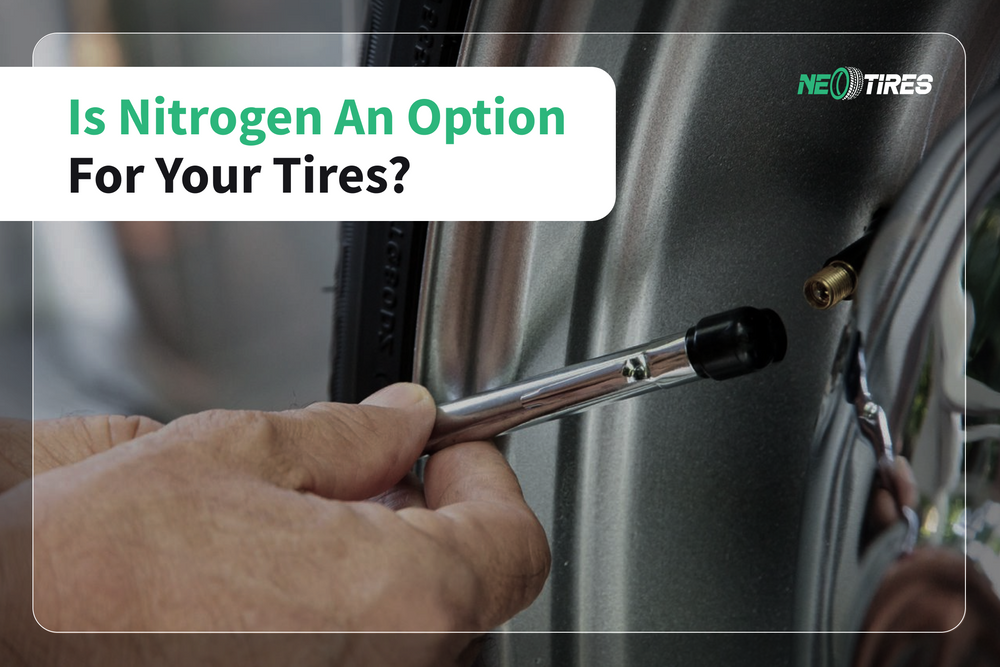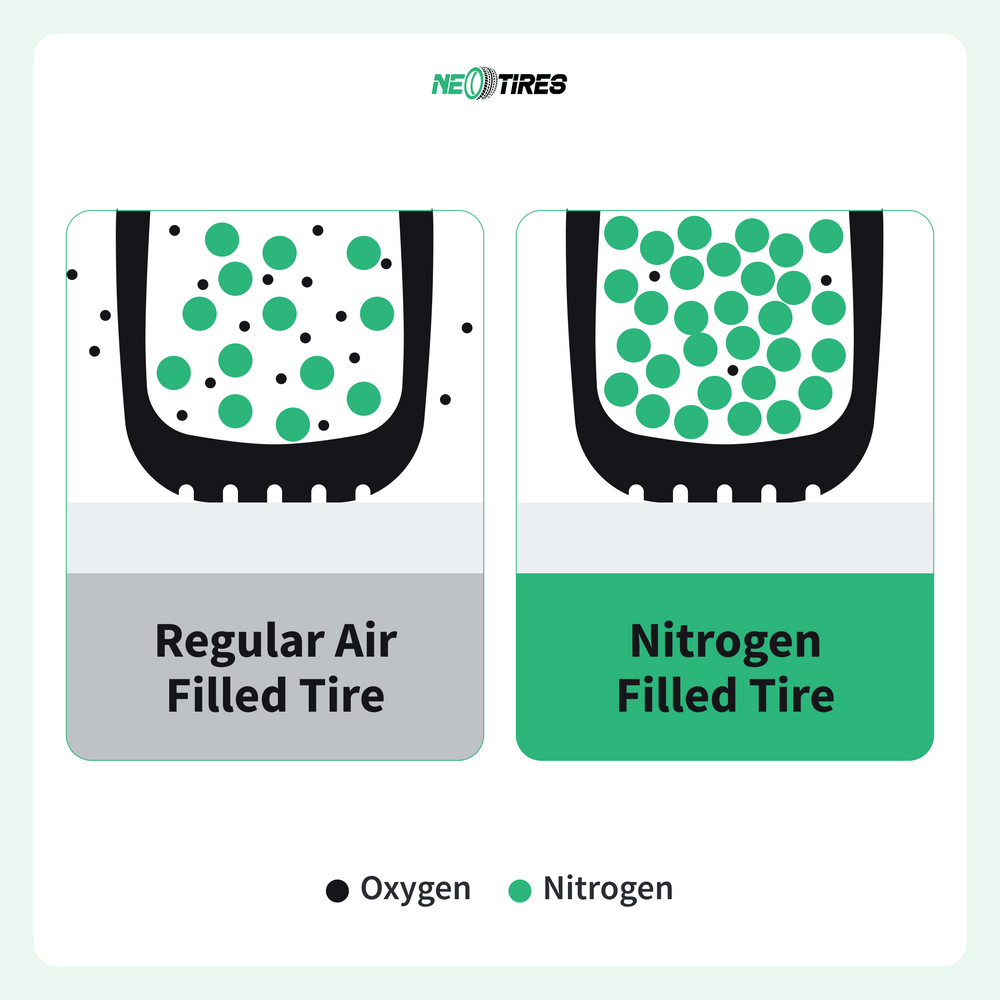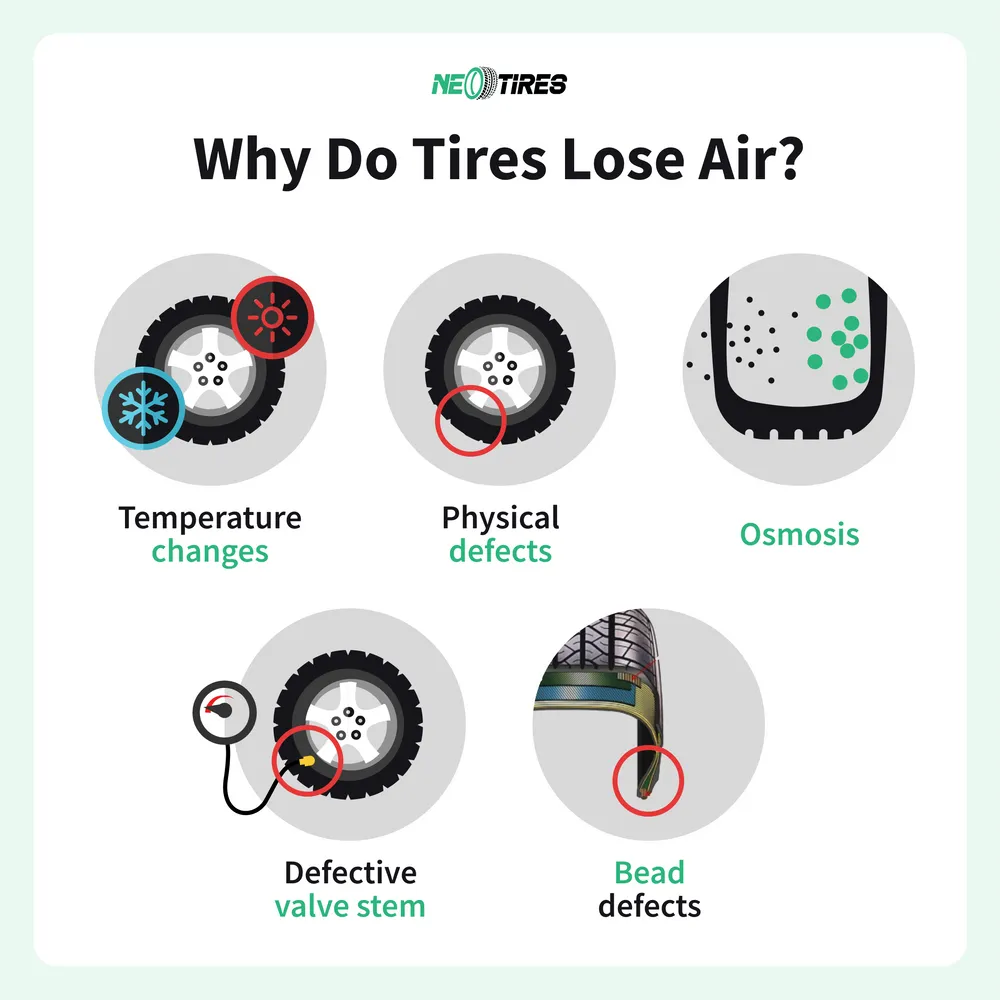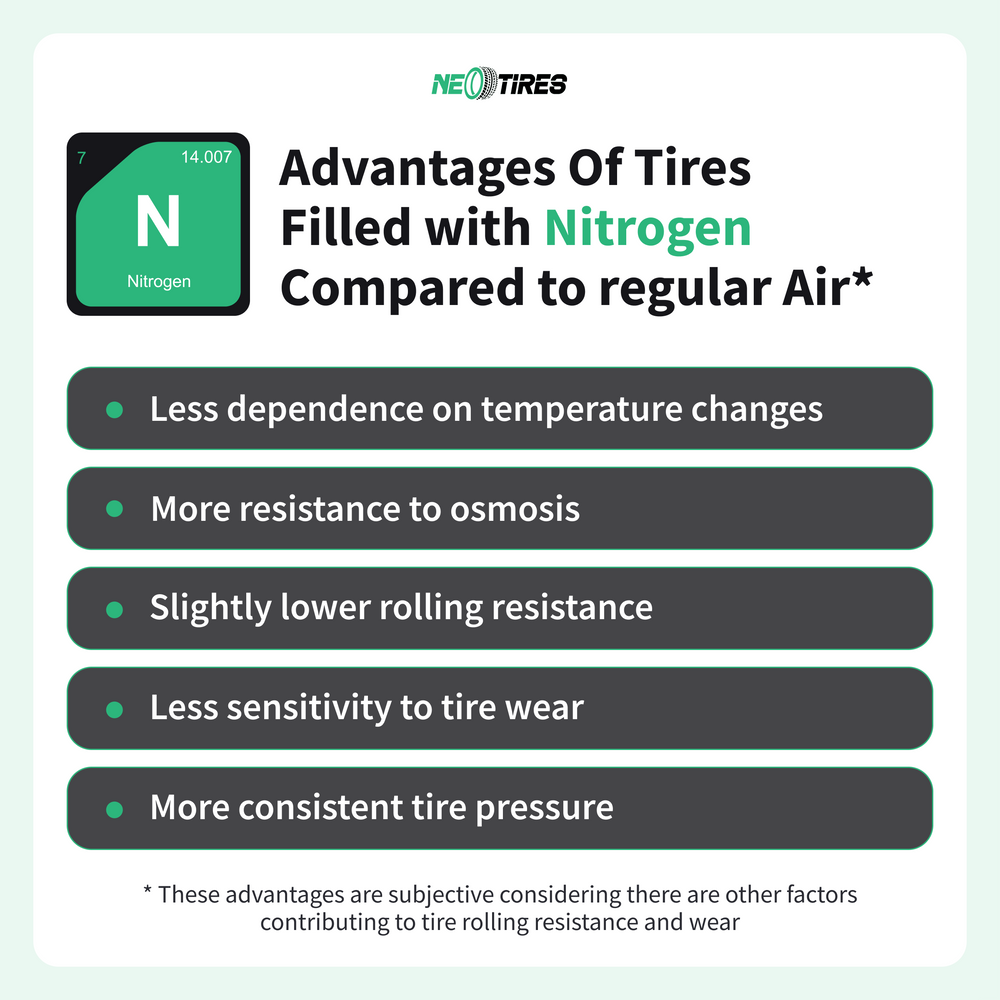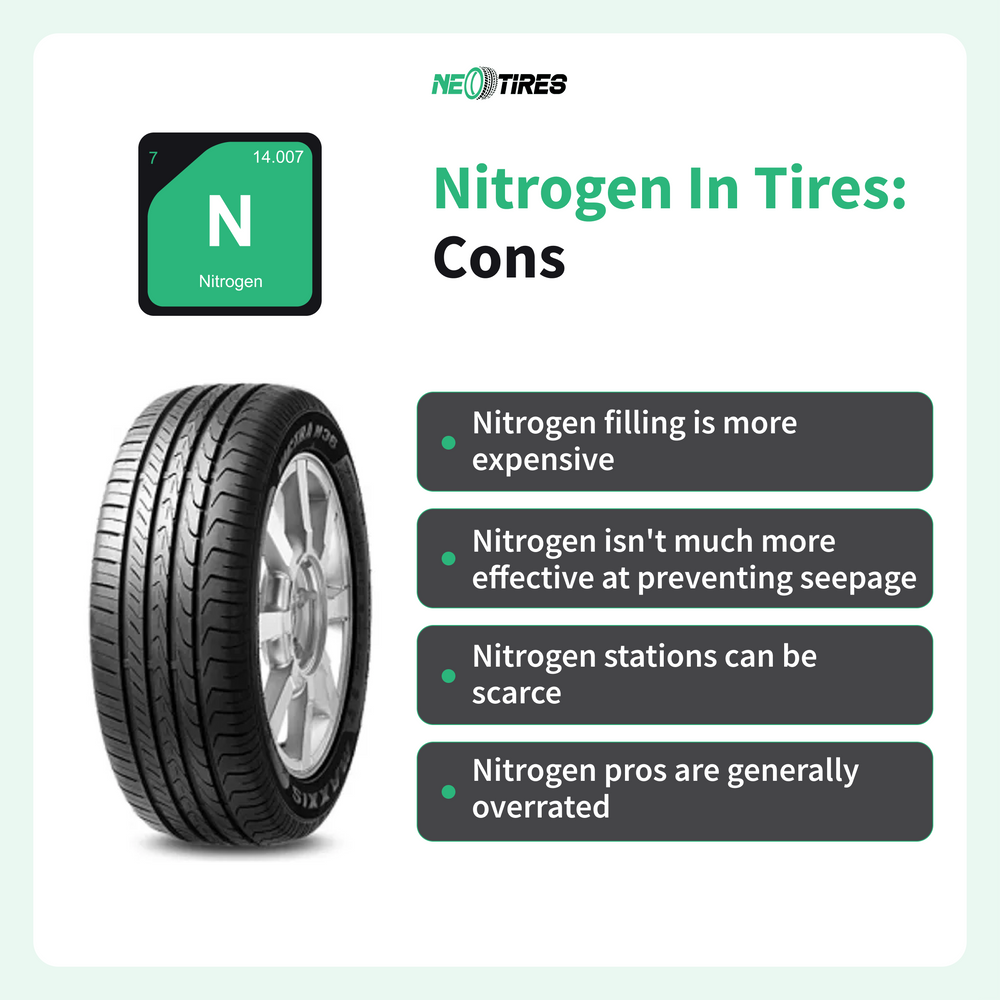Pumping air in tires is a common practice that is absolutely indispensable for the proper functioning of the vehicle and for maintaining the tires' health. However, we can see drivers opting for nitrogen filling in tires, which seems to be a beneficial substitute for them. Matter-of-factly, the air already contains a certain amount of nitrogen in it. However, the nitrogen option is believed to be a cleaner and purer alternative.
This subject generates many disputes among drivers and experts in the field. Many argue that nitrogen is more advantageous from a price point of view and more beneficial for the health of the tires. On the other hand, a large number of experts claim that the difference is actually not as big as it is believed. Well, we at Neotires took our time to investigate the matter. I spoke with various experts in this field to explain to readers everything they need to know about this topic. Curious? Say no more and let's dive in!
Is Nitrogen A Better Option?
To better understand how things work, let's start with the reasons why drivers usually switch to nitrogen instead of regular air. According to statistics, one of the most common reasons is that drivers want to make sure that the tire is less prone to underinflation. Let's take a closer look at this aspect.
Normally, any tire tends to lose air even if it is in good condition. This phenomenon occurs gradually and very slowly as a result of various factors. In this regard, drivers are encouraged to monitor the pressure level regularly and adjust it when they notice deviations. Otherwise, an underinflated tire entails a series of side effects that are not beneficial for good performance and reliability. Why is this happening? Let's see below.
Why Do Tires Lose Pressure?
Here we are talking about a multitude of factors more than a single reason. It can be about reasons for failure but also natural causes such as osmosis. Let's see what can lead to tire air loss.
Temperature Transitions
It is well known that tires are relatively sensitive to the thermal factor. Better said, the pressure in them fluctuates depending on temperature drop or increase. Surely you have noticed that the tires are slightly deflated during the winter, especially in the morning, after cold nights. This speaks of the fact that their air compresses in the cold, which is a natural physical phenomenon.
Once the temperature rises, or the tire rolls on the road, it heats up due to friction. As a result, the air molecules in it expand, which results in increasing the pressure in them. It is not for nothing that the TPMS can alert us in the morning about a potential pressure drop, while this alert disappears a little later. Everything is connected to the contraction and expansion of molecules depending on low or high temperatures, respectively.
Osmosis
Another natural reason for air loss is oxygen osmosis. This process refers to the natural elimination of oxygen through the structure of the tire. This process takes place very slowly, practically imperceptibly, and is particularly noticeable when the tires are not used for a long period.
Physical Defect
Another frequent reason is a possible puncture that the driver simply does not notice. Even a tiny nail in the tire is likely to generate tire deflation. Even if the driver pumps air into it, the tire deflates in a few days or even in a few hours anyway. Needless to mention a technical inspection and repair of the tire is necessary in case of a potential nail in it.
Defective Valve Stem
Sometimes drivers notice a little air in the tire, but they don't understand what the source of the problem is. The source, however, can be a defect in the valve stem through which the air flows. The defect can often be imperceptible in the form of small cracks. Even so, they are enough to disrupt the optimal pressure level so that the air drains gradually but surely.
Other Structural Defects
Sometimes it can be a structural failure between the tire and the bead. That is, the shape of the tire might change due to impacts or other defects, which can lead to poor air sealing between the tire and the bead. Consequently, the tire occasionally loses air at different rates depending on the driving conditions or the potential impacts on the tire.
Is Nitrogen Better Than Air?
Most drivers who opt for nitrogen instead of air do so for reasons of preventing underinflation. Theoretically, nitrogen use lowers the rate of air loss compared to the usual pressure based on air. The point is that nitrogen has a slightly more complex composition. The air molecules of the substance are larger and undergo the osmosis process more difficult. In the same context, they do not compress or expand to the same extent as ordinary air molecules do.
Investigations on this subject show that nitrogen tires maintain the pressure level a little better. At least, tire pressure is not so dependent on temperature fluctuations so much. Many believe that nitrogen does not undergo contraction or expansion at all. However, the truth is that this substance is, first of all, a gas. And this means that the contraction and expansion do take place, only at a lower level than that of ordinary air.
So, opting for nitrogen instead of regular air helps drivers maintain better pressure for a longer period. Nitrogen doesn't depend that much on temperature fluctuations and its molecules can't penetrate the rubber for osmosis at the same rate as regular air does.
However, we must mention that experts do not consider nitrogen a miraculous alternative. That is, it does not ensure constant pressure at 100%. This means that the tire still undergoes air leakage, only at a slightly lower rate. Also, the pressure will suffer downgrades anyway if the condition of the tire or valve stem is defective.
Nitrogen Benefits
One of the major nitrogen benefits consists of maintaining the pressure without being sensitive to temperature fluctuations. In this sense, we notice a secondary benefit that refers to better rolling resistance. That is, a tire with air impacts its rolling resistance depending on its pressure levels. The more deflated the tire, the higher the rolling resistance. This means more rubber on the road, and respectively, more fuel burning.
On the other hand, a nitrogen tire is more likely to maintain its optimal pressure level, especially in changing temperature conditions. As such, its rolling resistance remains more constant, so fuel burning does not suffer big changes.
In addition, it is worth noting that nitrogen offers a slight advantage in tire wear. The point is that a tire with insufficient air in it wears out faster and unevenly. This is because of the shape-changing due to less air in it. On the other extreme, the nitrogen tire is likely to resist wear and tear better as its shape remains constant because the pressure is also relatively constant- why is why NASCAR drivers choose to use nitrogen in their tires.
Notably, we want to draw the attention of drivers to the fact that nitrogen does bring some benefits. But these are not significantly large in the last instance. This is because fuel consumption and tire wear depend on many other factors besides tire pressure. For example, lack of timely tire rotation or wheel misalignment also leads to fuel efficiency drop and early tire wear.
Is It Easier To Maintain A Nitrogen-Filled Tire?
The pressure in the tires is crucial for their health and for the optimal performance of the vehicle. However, this requires regular pressure pumping, regular pressure checks, and pressure adaptation according to temperature changes. Are things easier with nitrogen tires? Do they need the same fuss as regular air-filled ones?
Actually, yes. Nitrogen filling does not remove regular tire inspection and adjustment from the equation. Drivers still have to measure the pressure regularly because, as said before, nitrogen is not a miracle alternative. The substance can leak after a tire or valve damage. Tire uneven wear due to underinflation is indeed something less common with nitrogen tires. However, the risk exists and drivers are not exempt from care, maintenance, and frequent inspection.
Can I Put Standard Air After Pumping Nitrogen For A While?
There is no evidence that the combination of air and nitrogen would somehow affect the tires and their performance. Most specialists don't see any problem in adding regular air to nitrogen tires. What matters is that the driver takes into account the pressure recommended by the manufacturer and adjusts it regularly as needed. It is more dangerous to drive with underinflated tires than with a mix of regular air and nitrogen. So, it's perfectly fine to use air on a permanent or occasional basis after using nitrogen for a while.
Nitrogen Or Air: Which Suits Me Better?
Both options will do whenever you keep an eye on the recommended pressure in your tires. In the end, it is important that the tire has the right pressure level for optimal performance and maintaining the health of the tire. Tires based on nitrogen indeed release air a little more slowly than those based on regular air. Respectively, they will keep their rolling resistance constant for a larger mileage.
However, it should be mentioned that experts and specialists in the field do not see a much more significant meaning in nitrogen tires. Since nitrogen filling and maintenance involve slightly higher costs than air-based tires, the economy does not prove to be substantial. So, in most cases, they don't see enough benefits to justify the price difference.
So, the final decision is in the hands of the drivers based on their comfort. Both options require constant pressure level monitoring and timely adjustment to reduce adverse effects.
When Are Nitrogen Tires A Good Option?
If you want to taste the experience of nitrogen tires, here are some scenarios in which they would fit better. You might want to use nitrogen if you have a race car and you are a spirited driver. Nitrogen will give you peace of mind of a stable pressure. Also, make sure you have a nitrogen filling station nearby. Many of the fueling stations lack this option and you may have difficulties with timely pumping of nitrogen.
Last but not least, take into account an available budget for nitrogen tire maintenance. If you switch from air to hydrogen tires, you could pay a whopping $30 for deflating and pumping with new gas. Also, nitrogen refilling could cost you around $7 per unit every time you have to adjust the pressure.
Finally, nitrogen tires might be a good option for drivers who forget to check or skip pressure adjustment for some reason. As the nitrogen tire keeps air for a little longer, it would help the driver to maintain the health of his tires and not compromise driving performance due to tire underinflation.
Does Nitrogen Prevent Dry Rot In Tires?
Several rumors circulate regarding the effect of nitrogen on the prevention of dry rot. Due to its dry nature, it is believed to be beneficial against tire moisture, and therefore against the formation of rot inside the tire. Indeed, a nitrogen tire generates a much lower level of moisture following the transition from cold to hot due to friction.
However, this has not proven to be a sustainable reason for preventing and eliminating the risk of dry rot. Here is a thing: modern technologies in the tire industry use special components to prevent corrosion, rust, and dry rot in tires regardless of the material used for pressure.
As such, nitrogen doesn't play a significant role in preventing this phenomenon. Rather, drivers must take care of the environment in which they store their tires when not used. An unfavorable environment can have a greater impact on the appearance of rot and rust.
Does Nitrogen In Tires Influence The Driving Experience?
You will not feel any difference in the driving experience if you use nitrogen instead of regular air. Nitrogen is a gas just like standard air and its role is to maintain the right pressure in the tires. It does not affect driving performance in any way compared to regular air.
Drivers will experience a lack of performance and tire wear whenever the tire pressure is not at the limit of the norm, regardless of whether they have air or nitrogen in them. So, for the sake of driving safety and performance, keep the pressure within the recommended limits regardless of the substance you use in your tires.
Why Trust Us?
NeoTires is a spirited team crazy about the tire industry. Each member has a special passion for it, for the technologies in tires, and for the way they perform in various conditions. It is this passion that brought us together. Here, we study this industry in depth, compare various products, test them, and identify all their advantages and disadvantages.
Besides the reviews, driving, and tire maintenance tips we share here, NeoTires is also about great tire deals. Throughout the 5 years of activity in the field, we have partnered with various reputable tire makers to be able to offer advantageous prices for top products. We know how important the quality of the tires is for superior performance in all conditions. And we want the superior quality to be accessible to any driver.
You can count on NeoTires whenever you need great products at an affordable price, assistance, and guidance in everything related to tires, fast shipping, and many other bonuses to help you improve your driving experience. Contact us as we are happy to share all we know about the best tire deals. Drive safe and choose your tires wisely!




